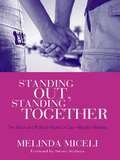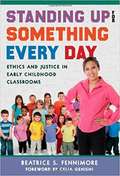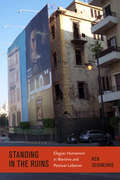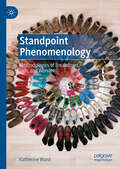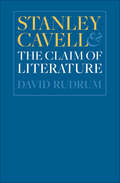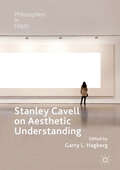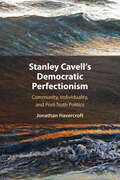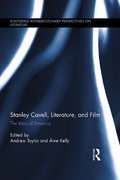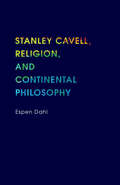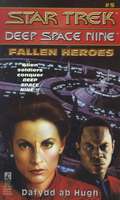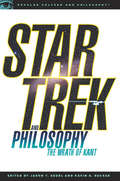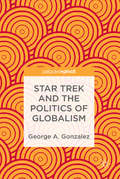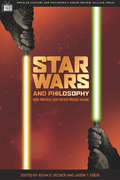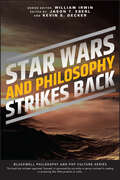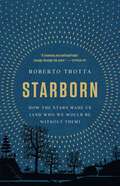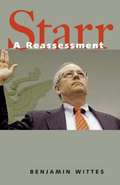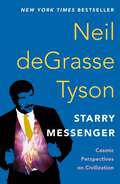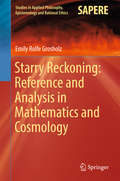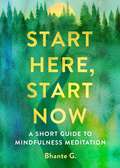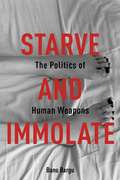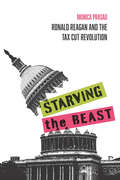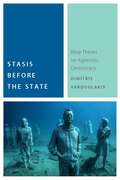- Table View
- List View
Standards of English in Higher Education
by Neil MurrayThe student demographic of universities today has changed quite dramatically from even a decade ago. As universities seek to internationalise, widen participation and derive attendant reputational and financial benefits, along with greater opportunities for research collaborations and industry links, they also face a growing challenge associated with what Neil Murray terms 'the English language question'. In particular, as the proportion of students of non-English speaking backgrounds entering universities increases, there is growing concern over levels of language proficiency and what this can mean for educational standards, the student experience and, ultimately, institutional standing. Standards of English in Higher Education unpacks a number of key and interrelated issues - for example, the assessment of proficiency and the structure and nature of provision - that bear on the question of English language standards and in doing so offers a frank critical appraisal of English language in higher education today.
Standing Out, Standing Together: The Social and Political Impact of Gay-Straight Alliances
by Melinda MiceliJust a decade ago, requests by students to establish groups to support gay and lesbian students were rare and generally met with shock and confusion by school administrators and local communities. Today there are more than 1600 gay straight alliances (GSAs) across the country. Standing Out, Standing Together documents the emergence of gay straight alliances in public schools across America - from factors that have contributed to the relatively rapid spread of GSA to those that stirred controversy and posed roadblocks. Using over 10 years of interviews with students, teachers, administrators and political activists; case studies; and local and national media reports, Miceli explores the personal and political stakes involved in the battles over GSAs. Although the book acknowledges and documents the harassment, abuse and problems suffered by many gay, lesbian, transgendered, and bisexual students, its primary focus is on these students as political activists, rather than as passive victims, making it a unique contribution to sociologists, educators, political activists and LGBTreaders alike.
Standing Up for Something Every Day: Ethics and Justice In Early Childhood Classrooms (Early Childhood Education)
by Beatrice S. Fennimore Sharon RyanStanding Up for Something Every Day is written for present and future teachers in the early childhood classroom who truly want to make a difference in the lives of children. Exploring some of the most complex and pressing social and ethical dilemmas confronting early childhood educators, the author provides concrete ways of addressing social justice concerns in practice. Four model teacher-guides accompany readers from chapter to chapter, and demonstrate strategies for standing up for children through ethics, respect for diversity, and commitment to advocacy. This book offers important insights, encouragement, and practical suggestions to early childhood educators who are committed to excellence and equity in their classrooms.
Standing by the Ruins: Elegiac Humanism in Wartime and Postwar Lebanon
by Ken SeigneurieSince the mid-1970s, Lebanon has been at the center of the worldwide rise in sectarian extremism. Its cultural output has both mediated and resisted this rise. Standing by the Ruins reviews the role of culture in supporting sectarianism, yet argues for the emergence of a distinctive aesthetic of resistance to it. Focusing on contemporary Lebanese fiction, film, and popular culture, this book shows how artists reappropriated the twin legacies of commitment literature and the ancient topos of “standing by the ruins” to form a new “elegiac humanism” during the tumultuous period of 1975 to 2005. It redirects attention to the critical role of culture in conditioning attitudes throughout society and is therefore relevant to other societies facing sectarian extremism.Standing by the Ruins is also a strong intervention in the burgeoning field of World Literature. Elaborating on the great Arabist Hilary Kilpatrick’s crucial insight that ancient Arabic forms and topoi filter into modern literature, the author details how the “standing by the ruins” topos—and the structure of feeling it conditions—has migrated over time. Modern Arabic novels, feature films, and popular culture, far from being simply cultural imports, are hybrid forms deployed to respond to the challenges of contemporary Arab society. As such, they can take their place within a World Literature paradigm: they are cultural products that travel and intervene in the world.
Standpoint Phenomenology: Methodologies of Breakdown, Sign, and Wonder
by Katherine WardThis book introduces a standpoint approach to phenomenology and reconceives the phenomenological project as not an individual but a communal endeavor—one that, importantly, requires insight from across the spectrum of human experience and especially experiences of those who have traditionally been absent from the discipline. To develop this approach, the book draws on the feminist tradition of standpoint epistemology. The book borrows two of standpoint epistemology’s key theses—that of situated knowledge (what we know is shaped and often limited by our social location) and inverted privilege (epistemological advantage can in some contexts be inversely related to one’s social location). In standpoint phenomenology, these develop into the thesis of situated phenomenology and inverted phenomenological privilege respectively. This book presents three specific methodologies that support the standpoint approach to phenomenology: the methodologies of breakdown, sign, and wonder. All have their origins in the classical phenomenological work of Heidegger and Merleau-Ponty. Though these methods are used by these phenomenologists, they are not explicitly articulated or explained in any detail. The book lays out how and why these methodologies can be used to reveal the conditions supporting human existence and then highlights the role each might play in a standpoint approach to phenomenology.
Stanley Cavell and the Claim of Literature
by David RudrumAn analysis of the significance of literature in the work of one of America's most influential contemporary philosophers.Stanley Cavell is widely recognized as one of America's most important contemporary philosophers, and his legacy and writings continue to attract considerable attention among literary critics and theorists. Stanley Cavell and the Claim of Literature comprehensively addresses the importance of literature in Cavell's philosophy and, in turn, the potential effect of his philosophy on contemporary literary criticism.David Rudrum dedicates a chapter to each of the writers that principally occupy Cavell, including Shakespeare, Thoreau, Beckett, Wordsworth, Ibsen, and Poe, and incorporates chapters on tragedy, skepticism, ethics, and politics. Through detailed analysis of these works, Rudrum explores Cavell's ideas on the nature of reading; the relationships among literary language, ordinary language, and performative language; the status of authors and characters; the link between tragedy and ethics; and the nature of political conversation in a democracy.
Stanley Cavell on Aesthetic Understanding (Philosophers in Depth)
by Garry L. HagbergThis book investigates the scope and significance of Stanley Cavell’s lifelong and lasting contribution to aesthetic understanding. Focusing on various strands of the rich body of Cavell’s philosophical work, the authors explore connections between his wide-ranging writings on literature, music, film, opera, autobiography, Wittgenstein, and Austin to contemporary currents in aesthetic thinking. Most centrally, the writings brought together here from an international team of senior, mid-career, and emerging scholars, explore the illuminating power of Cavell’s work for our deeper and richer comprehension of the intricate relations between aesthetic and ethical understanding. The chapters show what aesthetic understanding consists of, how such understanding might be articulated in the tradition of Cavell following Wittgenstein and J. L. Austin, and why this mode of human understanding is particularly important. At a time of quickening interest in Cavell and the tradition of which he is a central part and present-day leading exponent, this book offers insight into the deepest contributions of a major American philosopher and the profound role that aesthetic experience can play in the humane understanding of persons, society, and culture.
Stanley Cavell's Democratic Perfectionism: Community, Individuality, and Post-Truth Politics
by Jonathan HavercroftPost-truth politics is both a result of a democratic culture in which each person is encouraged to voice their opinion, and a threat to the continuation of democracy as partisans seek to deny political standing to those with incommensurate world views. Are there resources within political theory for overcoming this tension? This book argues that Stanley Cavell's philosophy provides a conceptual framework for responding to post-truth politics. Jonathan Havercroft develops an original interpretation of Stanley Cavell as a theorist of democratic perfectionism. By placing Cavell's writings in conversation with political theorists on debates about the social contract, interpretive methods, democratic theory and political aesthetics, Stanley Cavell's Democratic Perfectionism cultivates modes of responsiveness that strengthen our democratic culture and help us resist the contemporary crisis of democratic backsliding. Each chapter diagnoses a sceptical crisis in contemporary politics and a mode of responsiveness in Cavell's thought that can respond to that crisis.
Stanley Cavell, Literature, and Film: The Idea of America (Routledge Interdisciplinary Perspectives on Literature #13)
by Andrew Taylor Áine KellyThis is the first book to offer a thorough examination of the relationship that Stanley Cavell’s celebrated philosophical work has to the ways in which the United States has been imagined and articulated in its literature. Establishing the contours of Cavell’s most significant readings of American philosophical and cultural activity, the volume explores how his philosophy and the kind of reading it demands have an important relation to broader considerations of the American national imaginary. Focused, coherent, and original essays from a wide range of philosophers and critics consider how his investigations of Henry David Thoreau and Ralph Waldo Emerson, for example, represent a sustained engagement with the ways in which philosophy might provide us with new ways of thinking and of living. This is the first detailed and comprehensive treatment of "America" as a category of enquiry in Cavell’s writing, engaging with the terms of Cavell’s various configurations of the nation and offering readings of American texts that illustrate the possibilities that Cavell’s work has, in turn, for literary and film criticism. This study of the role played by philosophy in the articulation of the American self-imaginary highlights the ways in which the reading of literature, and the practice of philosophy, are conjoined in the ethical and political project of national self-definition.
Stanley Cavell, Religion, and Continental Philosophy
by Espen Dahl“Impressive . . . a gifted theologian . . . manages to place Cavell in conversation with continental thought as productively as anyone before him.” —Notre Dame Philosophical ReviewsThe American philosopher Stanley Cavell (b. 1926) is a secular Jew who by his own admission is obsessed with Christ, yet his outlook on religion in general is ambiguous. Probing the secular and the sacred in Cavell’s thought, Espen Dahl explains that Cavell, while often parting ways with Christianity, cannot dismiss it either. Focusing on Cavell’s work as a whole, but especially on his recent engagement with Continental philosophy, Dahl brings out important themes in Cavell’s philosophy and his conversation with theology.“It is undoubtedly tricky business writing a book about Stanley Cavell and any book enterprising enough to bring him into conversation with Christian theology should be additionally commended, especially one as likable as Espen Dahl’s.” —Modern Theology“Clearly, concisely, and powerfully shows Cavell’s frequent and deep links to and engagements with religion and religious themes and with (so-called) Continental philosophy . . . Dahl has also written a highly accessible book on Cavell, and yet one which in no way ‘waters down’ or dilutes Cavell’s thinking. There ought to be more books of this kind on Cavell.” —International Journal for the Philosophy of Religion“In making such a convincing case for claiming that religion is Stanley Cavell’s pervasive, hence invisible, business, Espen Dahl also puts Cavell’s writings into sustained and productive dialogue with the work of Levinas and Girard in ways other commentators have not previously managed.” —Stephen Mulhall, Oxford University
Star Trek Ds9: Fallen Heroes (Star Trek: Deep Space Nine #No. 5)
by Dafydd Ab HughWhen a troop of alien warriors demands the return of an imprisoned comrade -- a prisoner no one on Deep Space Nine #153; knows anything about -- Commander Benjamin Sisko has a deadly fight on his hands. Under sudden attack from the heavily armed warriors, Sisko and his crew struggle desperately to repel the invaders and save the lives of everyone on board. Meanwhile, a strange device from the Gamma Quadrant has shifted Ferengi barkeeper Quark and Security Chief Odo three days into the future to a silent Deep Space Nine. To save the station they must discover what caused the invasion to take place -- and find a pathway back through time itself.
Star Trek and Philosophy
by Kevin S. Decker Jason T. EberlPhilosophy and space travel are characterized by the same fundamental purpose: exploration. An essential guide for both philosophers and Trekkers, Star Trek and Philosophy combines a philosophical spirit of inquiry with the beloved television and film series to consider questions not only about the scientific prospects of interstellar travel but also the inward journey to examine the human condition. The expansive topics range from the possibilities for communication among different cultural backgrounds to questions about the stoic temperament exhibited by Vulcans to Ferengi business practices. Specifically chosen to break new ground in exploring the philosophical dimensions of Star Trek, these articles boldly go where no philosopher has gone before.
Star Trek and the Politics of Globalism
by George A. GonzalezThe Absolute, philosophized most saliently about by Georg Hegel, encompasses the entirety of reality. The absolute (reality) is composed of five dimensions – height, length, width, time, and justice. The five dimensions operate dialectically, and the normative values of reality inhere within the fifth dimension (justice) – hard, soft, moral, ethical, yellow, etc. ad infinitum. The normative values from the fifth dimension (justice), in combination with the brain, comprise the human mind. With the issues of climate change, world-wide biosphere destruction, nuclear weapons, international trade regimes, humanity has created the phenomenon of global politics – thereby changing the fifth dimension. The argument in this volume is that the broadcast iterations of Star Trek allow us to comprehend significant aspects of justice and the politics of globalism – created through the advent of science, technology, engineering, etc. The creators of Star Trek hold that nationalism is a psychological pathology and internationalism is rationality.
Star Wars and Philosophy
by William Irwin Kevin S. Decker Jason T. EberlThe Star Wars films continue to revolutionize science fiction, creating new standards for cinematographic excellence, and permeating popular culture around the world. The films feature many complex themes ranging from good versus evil and moral development and corruption to religious faith and pragmatism, forgiveness and redemption, and many others.The essays in this volume tackle the philosophical questions from these blockbuster films including: Was Anakin predestined to fall to the Dark Side? Are the Jedi truly role models of moral virtue? Why would the citizens and protectors of a democratic Republic allow it to descend into a tyrannical empire? Is Yoda a peaceful Zen master or a great warrior, or both? Why is there both a light and a dark side of the Force? Star Wars and Philosophy ponders the depths of these subjects and asks what it truly means to be mindful of the "living force."
Star Wars and Philosophy Strikes Back: This Is the Way (The Blackwell Philosophy and Pop Culture Series)
by William IrwinShould droids be free? Should clone troopers? What political and ethical ideas ground resistance and rebellion? What’s wrong with the way women are portrayed in Star Wars? Does Han Solo have a philosophical worldview? Was Galen Erso responsible for the destruction of Alderaan? Should you eat Baby Yoda? “This is the Way.” In Star Wars and Philosophy Strikes Back, the Way wends through entirely new adventures in the Star Wars galaxy far, far away: not only the films of the Skywalker saga, but also Rebels, The Bad Batch, Rogue One, Solo, and The Mandalorian. Like the creators of these films and television series, the authors in this book harness the magical mix of humor, action, empathy, characterization, adventure, and fan service that constitutes Star Wars. In addition to thorny metaphysical questions about the nature of time and free will, this volume highlights the staggering cultural impact of George Lucas’s universe. The newest Star Wars narratives tackle ethnicity on alien worlds and how love and sex with a droid like L3-37 would work (“It works”). The connections between the Separatist Freedom Movement and the struggle for social justice in the USA in the 21st century are brought to light. And philosophical second looks at Rian Johnson’s The Last Jedi prove there is much more to this controversial entry in the Skywalker saga. Thirty-six philosophers, both sages and scoundrels among them, examine the full range of deep questions throughout the Star Wars chronology—from The Phantom Menace to The Rise of Skywalker and beyond. “They have spoken.”
Starborn: How the Stars Made Us (and Who We Would Be Without Them)
by Roberto TrottaAn astronomer "who writes like a poet" (Wall Street Journal) gives a sweeping, "beautifully written" (Nature) inquiry into how the night sky has shaped human history For as long as humans have lived, we have lived beneath the stars. But under the glow of today&’s artificial lighting, we have lost the intimacy our ancestors once shared with the cosmos. In Starborn, cosmologist Roberto Trotta reveals how stargazing has shaped the course of human civilization. The stars have served as our timekeepers, our navigators, our muses—they were once even our gods. How radically different would we be, Trotta also asks, if our ancestors had looked up to the night sky and seen… nothing? He pairs the history of our starstruck species with a dramatic alternate version, a world without stars where our understanding of science, art, and ourselves would have been radically altered. Revealing the hidden connections between astronomy and civilization, Starborn summons us to the marvelous sight that awaits us on a dark, clear night—to lose ourselves in the immeasurable vastness above.
Starr: A Reassessment
by Benjamin WittesAn attempt at a balanced view of Ken Starr's contributions.
Starry Messenger: Cosmic Perspectives on Civilization
by Neil deGrasse TysonNEW YORK TIMES BESTSELLERBringing his cosmic perspective to civilization on Earth, Neil deGrasse Tyson shines new light on the crucial fault lines of our time—war, politics, religion, truth, beauty, gender, and race—in a way that stimulates a deeper sense of unity for us all.In a time when our political and cultural views feel more polarized than ever, Tyson provides a much-needed antidote to so much of what divides us, while making a passionate case for the twin chariots of enlightenment—a cosmic perspective and the rationality of science.After thinking deeply about how science sees the world and about Earth as a planet, the human brain has the capacity to reset and recalibrates life’s priorities, shaping the actions we might take in response. No outlook on culture, society, or civilization remains untouched.With crystalline prose, Starry Messenger walks us through the scientific palette that sees and paints the world differently. From insights on resolving global conflict to reminders of how precious it is to be alive, Tyson reveals, with warmth and eloquence, an array of brilliant and beautiful truths that apply to us all, informed and enlightened by knowledge of our place in the universe.
Starry Reckoning: Reference and Analysis in Mathematics and Cosmology
by Emily Rolfe GrosholzThis book deals with a topic that has been largely neglected by philosophers of science to date: the ability to refer and analyze in tandem. On the basis of a set of philosophical case studies involving both problems in number theory and issues concerning time and cosmology from the era of Galileo, Newton and Leibniz up through the present day, the author argues that scientific knowledge is a combination of accurate reference and analytical interpretation. In order to think well, we must be able to refer successfully, so that we can show publicly and clearly what we are talking about. And we must be able to analyze well, that is, to discover productive and explanatory conditions of intelligibility for the things we are thinking about. The book's central claim is that the kinds of representations that make successful reference possible and those that make successful analysis possible are not the same, so that significant scientific and mathematical work typically proceeds by means of a heterogeneous discourse that juxtaposes and often superimposes a variety of kinds of representation, including formal and natural languages as well as more iconic modes. It demonstrates the virtues and necessity of heterogeneity in historically central reasoning, thus filling an important gap in the literature and fostering a new, timely discussion on the epistemology of science and mathematics.
Start Here, Start Now: A Short Guide to Mindfulness Meditation
by Bhante GunaratanaA new book distilling Wisdom&’s definitive masterpiece on mindfulness and all-time bestseller, Mindfulness in Plain English, down to a pocket-sized guide with everything you need to get started practicing mindfulness right now.In a clear, friendly voice, this concise collection of beloved and renowned meditation master Bhante G&’s bestselling instructions will teach you everything you need to know to start—and maintain!—your mindfulness meditation practice. The book includes practical advice on What to do with the body and mind in meditation; What to do when the mind wanders and how to work with distraction; How to deal with physical discomfort in meditation; How to overcome drowsiness, boredom, and inability to concentrate; How to work with fear and agitation, judgments, and self-criticism; How to avoid trying too hard, expecting too much, or getting discouraged; 11 common misconceptions about meditation; 10 tips for effective practice; and how to get the most out of your practice.
Starve and Immolate
by Banu BarguTells the story of leftist political prisoners in Turkey who waged a deadly struggle against the introduction of high security prisons by forging their lives into weapons.
Starve and Immolate: The Politics of Human Weapons
by Banu BarguTells the story of leftist political prisoners in Turkey who waged a deadly struggle against the introduction of high security prisons by forging their lives into weapons.
Starve and Immolate: The Politics of Human Weapons (New Directions in Critical Theory #33)
by Banu BarguStarve and Immolate tells the story of leftist political prisoners in Turkey who waged a deadly struggle against the introduction of high security prisons by forging their lives into weapons. Weaving together contemporary and critical political theory with political ethnography, Banu Bargu analyzes the death fast struggle as an exemplary though not exceptional instance of self-destructive practices that are a consequence of, retort to, and refusal of the increasingly biopolitical forms of sovereign power deployed around the globe.Bargu chronicles the experiences, rituals, values, beliefs, ideological self-representations, and contentions of the protestors who fought cellular confinement against the background of the history of Turkish democracy and the treatment of dissent in a country where prisons have become sites of political confrontation. A critical response to Michel Foucault's Discipline and Punish, Starve and Immolate centers on new forms of struggle that arise from the asymmetric antagonism between the state and its contestants in the contemporary prison. Bargu ultimately positions the weaponization of life as a bleak, violent, and ambivalent form of insurgent politics that seeks to wrench the power of life and death away from the modern state on corporeal grounds and in increasingly theologized forms. Drawing attention to the existential commitment, sacrificial morality, and militant martyrdom that transforms these struggles into a complex amalgam of resistance, Bargu explores the global ramifications of human weapons' practices of resistance, their possibilities and limitations.
Starving the Beast: Ronald Reagan and the Tax Cut Revolution
by Monica PrasadSince the Reagan Revolution of the early 1980s, Republicans have consistently championed tax cuts for individuals and businesses, regardless of whether the economy is booming or in recession or whether the federal budget is in surplus or deficit. In Starving the Beast, sociologist Monica Prasad uncovers the origins of the GOP’s relentless focus on tax cuts and shows how this is a uniquely American phenomenon. Drawing on never-before seen archival documents, Prasad traces the history of the 1981 tax cut—the famous “supply side” tax cut, which became the cornerstone for the next several decades of Republican domestic economic policy. She demonstrates that the main impetus behind this tax cut was not business group pressure, racial animus, or a belief that tax cuts would pay for themselves. Rather, the tax cut emerged because Republicans believed that following World War II, Democrats had created an extremely durable power structure based on offering government programs to Americans, through which they were able to unify an otherwise fractious coalition of farmers, workers, and African Americans and retain control of Congress for four decades. Republicans were reduced to lecturing about balanced budgets, an issue that did not win them many elections. The Republican party began to see tax cuts as an opportunity to alter these basic building blocks of American power. If Democratic power was built out of government programs, Republicans found a new power source in offering tax cuts. Once it became clear that the resulting deficits could be financed by foreign capital, this program reoriented the Republican Party, transforming it from the party of fiscal rectitude into a party whose main domestic policy goal is reducing taxes. With one party promoting government programs to appeal to voters and the other party promoting tax cuts to appeal to voters, and neither party able to generate electoral coalitions around addressing more pressing political and economic problems, this history reveals problems at the heart of contemporary American democracy itself. Prasad suggests some ways forward. Since the end of World War II, many European nations have combined strong social protections with policies to stimulate economic growth such as lower taxes on capital and less regulation on businesses than in the U.S. Starving the Beast suggests that taking inspiration from this model of progressive policies embedded in market-promoting political economy could serve to build an American economy that works better for all.
Stasis Before the State: Nine Theses on Agonistic Democracy (Commonalities)
by Dimitris VardoulakisThis book critiques the relation between sovereignty and democracy. Across nine theses, Vardoulakis argues that sovereignty asserts its power by establishing exclusions: the sovereign excluding other citizens from power and excludes refugees and immigrants from citizenship. Within this structure, to resist sovereignty is to reproduce the logic of exclusion characteristic of sovereignty.In contrast to this “ruse of sovereignty,” Vardoulakis proposes an alternative model for political change. He argues that democracy can be understood as the structure of power that does not rely on exclusions and whose relation to sovereignty is marked not by exclusion but of incessant agonism.The term stasis, which refers both to the state and to revolution against it, offers a tension that helps to show how the democratic imperative is presupposed by the logic of sovereignty, and how agonism is more primary than exclusion. In elaborating this ancient but only recently recovered concept of stasis, Vardoulakis illustrates the radical potential of democracy to move beyond the logic of exclusion and the ruse of sovereignty.

